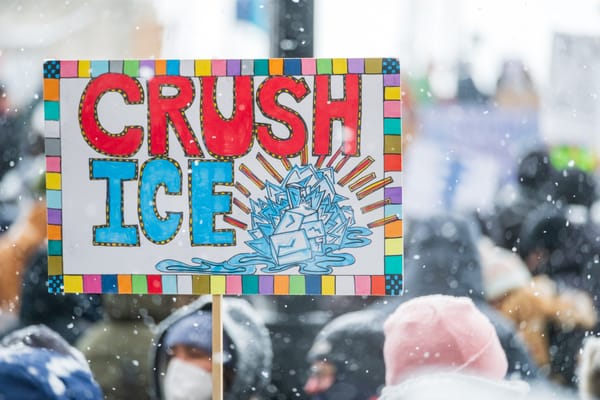Finding Your Stride in the Struggle
“This is the moment to find a new gear,” says organizer Daniel Hunter.


When Donald Trump won the 2024 presidential election, many of us turned to the words of activist and educator Daniel Hunter for comfort and direction. Hunter’s piece 10 Ways to be Prepared and Grounded Now that Trump Has Won offered practical and strategic advice to disrought people of conscience who were reeling in the wake of Trump’s victory. Hunter’s analysis included the observation that “differentiated resistance pathways” would emerge with time. Hunter specified that four of those pathways would be “Protecting People,” “Defending Civic Institutions,” “Disrupt and Disobey,” and “Build Alternatives.” Many politically engaged people are now trying to find their footing within those pathways, while also weathering Trump’s ongoing attacks. I recently had the opportunity to catch up with Hunter to discuss the moment we’re in, and how we can maintain our focus and commitment in these chaotic times.
This interview has been lightly edited for length and clarity.
Kelly Hayes: You wrote a piece that helped a lot of people ground themselves after Trump's re-election. Now a couple of months into his administration, a lot of us are trying to navigate a new reality. Universities are under attack along with law firms that have taken legal action in opposition to Trump's edicts. People with permanent resident status have been snatched up by ICE and face deportation, and hundreds of Venezuelan immigrants have been sent to a prison in El Salvador without any due process. How do you view this moment we're experiencing right now and how should we be approaching it?
Daniel Hunter: Well, you framed the bad part very accurately. It's very dire. There's a lot of systems that we've relied upon in the past that are under attack. One of my friends who works with undocumented residents said the current challenge is that the rules of ICE are unknown right now, and so we don't know how to stay safe. The behaviors of how they've operated have changed. We used to know their patterns.
The other thing that's also happening is new forms of resistance are up and running. One of the most underreported acts of non-compliance was 1.6 million federal workers who were non-compliant with Elon Musk. When Musk first publicized his demand that federal workers submit a list of five things they did last week via email to OPM [the Office of Personnel Management], he said that anyone who failed to comply would be fired. OPM didn't mention the part about potentially being fired in the email it sent to federal employees, but the news media sure echoed it. So the mainstream media told everybody that's what the email was and that's what would happen. And workers began organizing on Signal threads and saying, I don't want to comply with this. And began confirming to each other and boosting each other up. And then that moved to the union.
So AFGE [American Federation of Government Employees] and others soon followed suit and said, they're also not going to comply. And then that fell as the pressure mounted, even some of the directors, including some of the sycophants like Patel and Rubio and others, also began following suit and telling people to not comply with Musk's demand. And so we're living in a very interesting time because of everything you just said about dire circumstances, and also, there’s an incredible range of non-compliance. Erica Chenoweth just did a report with some of her colleagues where they noted that in February [2025] alone, there were twice as many protests than in [all of] 2017.
And so even though it hasn't been as centralized as it was, it's actually a greater range of tactics, more boycotts, more experiments with targeting different things, more range of activity, more people in the streets, that all of those things are true in this moment. And that, I think, should also be in our analysis and in our feeling, which is both—there's a lot of dire stuff and there's also a lot of people trying to figure out how to resist. And that should give us a lot of hope. I don't know if it has to give us hope actually, but it should give us a lot of analysis that people are up for resisting.
KH: What do you think of the Tesla takedown movement that's underway?
DH: I love it.
KH: Me too. I really appreciate that it’s targeting Elon Musk, and also pursuing a material outcome. When people see the stock drop, they can see the impact they’re having, and I think that’s so helpful and empowering. I also think it’s a movement that’s pulling us in the right direction, in terms of challenging these oligarchs and billionaires.
DH: I think you're absolutely right. And I think I want to just affirm many of the things you just said. The Tesla Takedown is a great example of decentralized protest. It's not a single organization directing people about what to do. People are able to figure this out and they’re making some smart, strategic decisions.
I think tactically it's smart. It's also a good direction for us, in terms of making a direct economic impact. It gives us a good narrative, and a chance to organize locally. It gives us a lot of things, but I think there are going to be challenges ahead. I think at some point the protests will start to reach a kind of threshold, and might reach the limit of their impacts. Either because Musk is able to do enough damage control, or they do some reshaping inside the Tesla structure. But I think there may be other tactics that we then need to expand to target SpaceX and Starlink. And I think those are a little bit more tricky targets, but they're ones that Musk also cares deeply about.
KH: On April 20th, the secretaries of the Department of Defense and the Department of Homeland Security are supposed to deliver a report pursuant to one of Trump's early executive orders, offering a recommendation about whether or not Trump should invoke the Insurrection Act. Are you worried about this report and what it could mean for the public and for our movements?
DH: We're already seeing, as you mentioned at the top of the intro, some of the repression that's beginning and some of the outlines of how that's going to unfold. They’re targeting marginalized communities—people who are on the fringes and edges of our society to see how much they can get away with. And so, with regards to the Insurrection Act, I think it's really important for us to speak out about these cases of Palestinian rights activists who've been targeted for deportation. Those are test cases for criminalizing protesting and criminalizing dissent. So regardless of your particular position on what they're up to, the criminalizing of people for speech and for protest—these are test cases. So there has to be pushback now.
I think the second thing is that activists need to continue assessing what kind of security infrastructure we need to put in place. And I think the way that I've been trying to hold this for people in terms of thinking through that question of security and my safety is not only thinking about how do I improve my own security, but also the question of how I support the safety of the entire movement.
So there's an organization in the South that got targeted by the federal government. It's been under attack, and one of the ways that it really got taken out was that when it got targeted, people inside the organization began to openly talk to the media about the group’s internal dissension. That fed a firestorm. So one of the things that we need to do is to take responsibility for each other in a community sense and take responsibility for the safety of the movement, which means not only just looking out for our own individual self, but also looking out for how our actions are impacting other people's safety and security. The longevity of the organization.
So fidelity to movement and fidelity to each other means that we also look out for each other, which often can just be summarized as you don't comply. Whatever the 10 commandments by Czechs against the Soviet Invasion were: Don’t know, don’t tell, don’t have, etc. —just practice discretion. So I think those are behaviors that we should be practicing in rigorous ways because whether the Insurrection Act gets used or not, the intention of this current administration is clear, which is: they're going to go after protesters as much as they can get away with.
KH: And on that note, when you and I talked shortly after Trump's re-election, we were in agreement that symbolic arrests were probably not the best thing to pursue at the onset of the Trump administration. Do you still feel that way?
DH: I do. There's going to be lots of opportunities for people to demonstrate and protest. And I think more and more symbolic protests will be very important to signal to people that there's a lot of people like you. So there are high percentages of the US population that are concerned and are not well aware of the number of people who are already in motion. So we all have a responsibility to tell that story to other people, to tell stories of non-cooperation, of the protests, of the Global Days of Action, etc. And so outlets like yours, Kelly, are so important because people need that message because the mainstream media has been terrible, absolutely terrible, at some of its worst in terms of talking about examples of non-cooperation and non-compliance and protests that are happening right now.
In terms of symbolically getting arrested or some of the civil disobedience actions, the place that we need to get to is material challenges, taking over institutions, taking over structures that are currently being battled for. And so things like Tesla Takedown represent a material gain, causing direct economic damage to Elon Musk. That, strategically, is more important than mere symbolism. That might move a few more people, but we're going to have a lot of opportunities to potentially get arrested later down the road.
KH: I really agree with that. I consider arrests a resource. I can only get arrested so many times before the consequences become increasingly dire. And we have a long road ahead, and may have opportunities to stop material harms from happening by putting ourselves in arrestable situations. I want to be ready for that. I also want to clarify that I am not talking about staying within the lines and not breaking the law, but about evading arrest whenever possible, unless there’s a material impact involved, or the opportunity to prevent something harmful from happening.
DH: I just want to affirm that there are some fantastic uses of civil disobedience happening right now, like the Sunrise Movement doing an action at the Department of Education when it became clear the department was in danger of being taken out entirely. A small number of people risked arrest, and that action became the image of resistance around the Department of Education. They gave mainstream media who need a hook an image of a bunch of young people taking a stand. FreeDC did another kind of similar action. And so those are very critical and are very much gifts to the movement in that regard because they assist in telling a story, but this didn’t involve a larger push for people to get arrested in that moment.
KH: What kind of action do you encourage people to take right now? What's your vision for how we move?
DH: This is a really important time for some experiments, and so for people to feel free to try some different things, to find tactics that move widely, and especially speaking to the “disrupt and disobey” people here. It's also a really important moment to have conversations with institutions to prepare them for what could be coming their way. So there's been a lot of conversation about, for example, the capitulation of Columbia University at multiple levels, but they have signaled that they are willing to capitulate to the Trump administration. Equally, we should pay attention to Georgetown University, which has signaled its refusal to capitulate. And in fact, they were told that the administration wouldn't hire any of their graduates and they came back strong with a very principled stance, and then escalated their response by saying that they would give tuition reduction to federal workers.
So that Georgetown letter is an example of what an institution does when it's holding fast. And we need more examples of that. We also need to tell that story to institutions, because Georgetown has not gotten more and more repression as a result of it. And Columbia, by being soft, actually has shown its weakness, its underbelly, and therefore gotten more severely targeted. And that is commonplace in authoritarian regimes. So a little bit of what we have to do for those of us who are in the disruption category, is to have conversations with institutions to help teach them the strategy of non-cooperation and the strategy that there will be no place in which you will be safe by complying. That is a myth that you're making for yourself.
Because if anybody remembers watching The Sopranos, when you're dealing with the mafia, as soon as they know you're weak, they know they can keep going back to take advantage of you. And so the alternative is to show your strength. And that doesn't guarantee you won't get repressed, but repression has already happened at Columbia: $400 million getting lost in their budgets. So part of what we have to do is help people understand and get an analysis of the moment of where we are. We're very late in the day for people trying to comply to make it through. It's not going to work out.
One more thing that I'm aware of, based on what I can see, is that it looks as though a lot of our adrenaline is beginning to wear off at around this moment. For a lot of activists, there's a drop happening. Physiologically, what we know about adrenaline and oxytocin is that these things get lodged in your body. And so if you haven't been—which, I haven't been as much—this is an important time to keep your body in physical motion: running, jumping, having sex, whatever it is, but getting a lot of that, just things in your system moving.
And the second thing: what I've noticed or observed is, for groups that have been in constant motion, their triage mechanisms are now beginning to fracture a bit. People's exhaustion levels are increasing. And so this is an important moment for checking back in about how much you can handle, and the pace that you need to move at.
I think we know enough about the rhythm of the administration’s strategy, that you can kind of trust yourself, if you've been tracking, to not read the news in the way you may have been before, because you know the outlines of what they're doing. It may be a moment to downshift the amount of projects you've been up to, or also just notice the judgment that you've been laying on your colleagues that maybe you can let go of a little bit, because there's just been so much going on.
People have been working in the context of overload. And we will not be able to survive if we burn ourselves out by treating this like a sprint. And so again, psychology is really important in this moment. And what I've noticed is there seems to be an energetic shift around this period of time. And so that seems to be important for me as I'm chatting with people, to just remind them this is the moment to find a new gear.
Organizing My Thoughts is a reader-supported newsletter. If you appreciate my work, please consider becoming a free or paid subscriber today. There are no paywalls for the essays, reports, interviews, and excerpts published here. However, I could not do this work without the support of readers like you, so if you are able to contribute financially, I would greatly appreciate your help.




